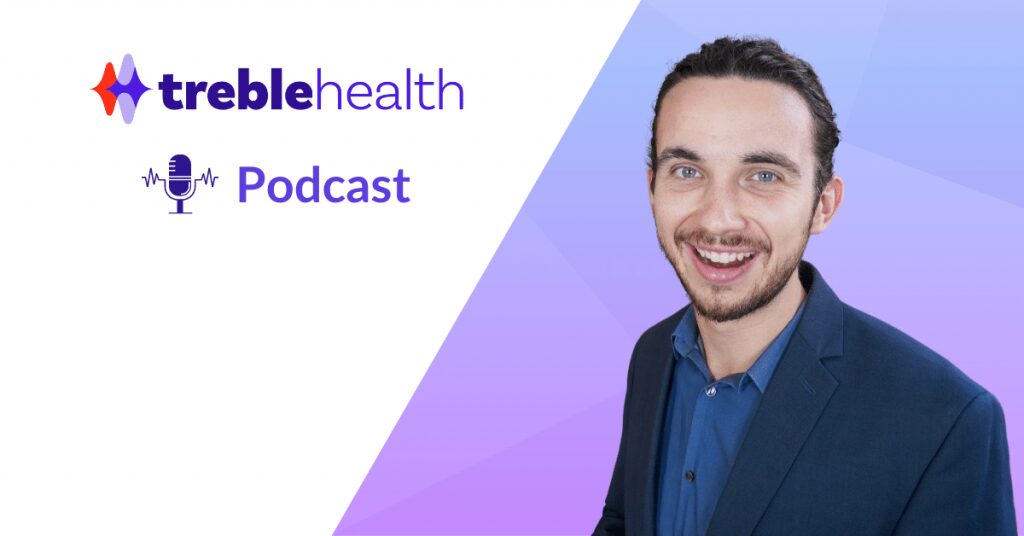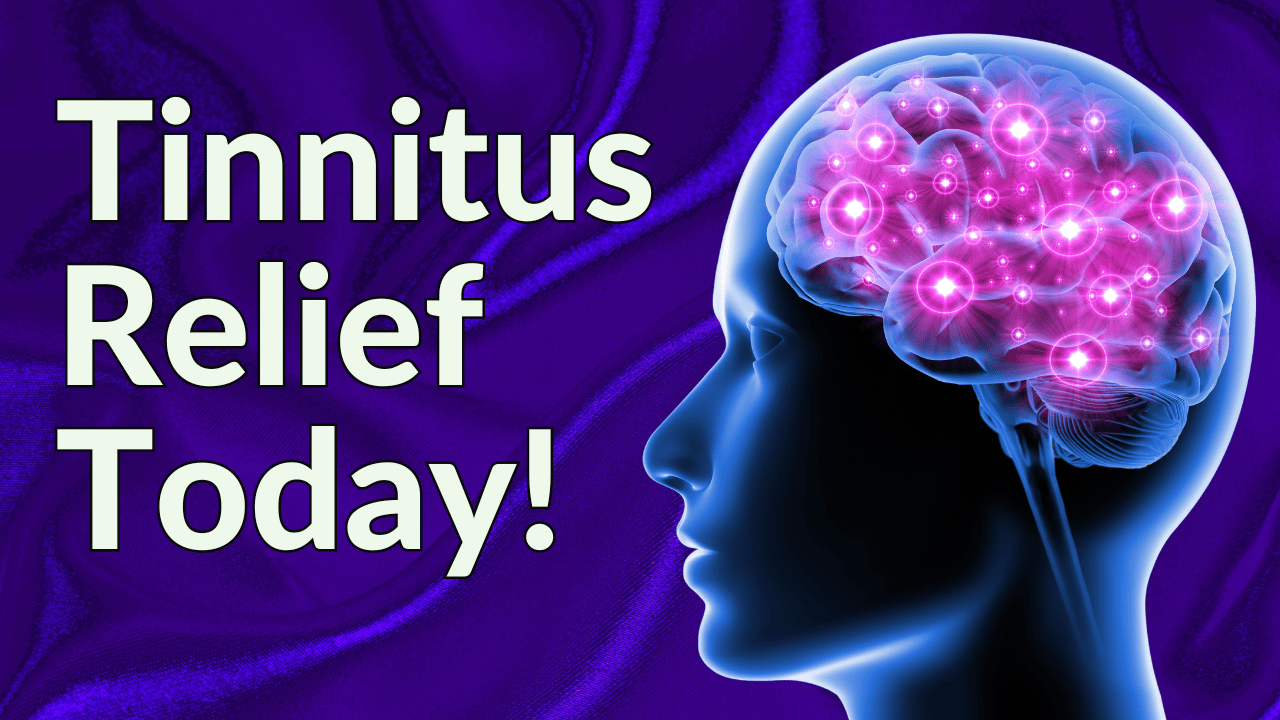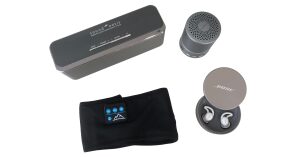Ben Thompson, AuD.
Hello everyone, my name is Dr. Thompson. Welcome to episode 29 of my podcast where we have Esther who is a patient of mine. We met each other about six months ago. Esther, please introduce yourself and how you found me.
Esther
My name is Esther Gonzales, and I’m from Miami, Florida, and I found Dr. Ben after having received my second vaccine of COVID and developed my tinnitus. I did a search on YouTube on tinnitus and you were the first person that came up.
Ben Thompson, AuD.
And talk us through where you are now compared to when you started. Walk us through just big picture, what did you experience of the last six months or so?
Esther
Well, my beginning was very rough. As soon as I developed the tinnitus, I immediately ran to the emergency room and plenty of doctors told the same story by everyone that this was not treatable, that I had to learn to live with it.
"Treble Health helped me reduce my tinnitus by about 80%, and now I can live my life again!"


"Treble Health helped me reduce my tinnitus by about 80%, and now I can live my life again!"
– Steve D.
Book a free consultation to learn which Treble Health solution is right for you. Join Steve and thousands more who have found lasting tinnitus relief.
I went through medication, Xanax so that I could sleep at night, panic attacks, fear of losing my job, went on family medical leave at my job so that my job could be protected because I was sure I was going to lose my job. And I went from that extreme to complete silence, on certain days I don’t hear my tinnitus.
Ben Thompson, AuD.
Now explain to us more about what you did really, how did you get there? And some context now that we know, okay, you went from a loud obtrusive tinnitus that sends you to the various doctors, you were taking prescription drugs to help sleep around the tinnitus, you were also going through some other things. Tell us now, given that we know it got so much better, everyone wants to know, okay, Esther, that’s great, we’re happy for you. What did you do? What did you take seriously? And what were the challenges through that process? How long did it take? Can you give us some details on that?
Esther
Well, sure, the first thing I did is I started listening to basically every single video you had out there on YouTube. And I did become aware that I was doing a lot of things like hyper focusing, I spent all day just keeping my mind on the volume of my tinnitus. And I started listening to your suggestions, try to focus on something other than the tinnitus, a healthy lifestyle, I started walking in the evenings because I couldn’t sleep. So I would walk and that made my sleeping, it took it from one level to the next. I cut down on my sodium. I bought the sound machine that you recommended, that was the first thing I did. I kept that around my work area since I work from home and that helped me to be able to focus on my job. The meditation, your videos on meditation, I took those very seriously. The first video you ever made, I would listen to that night after night, day after day. Every time I would start to go into panic mode, I would just put the video on. Sometimes I would wake up two, three times at night where I couldn’t sleep, and then the noise would become louder and louder and I would focus on the meditation videos. All those things put together, I think really, really helped me. And I’m at a point now where there’re times its just complete silence.
Ben Thompson, AuD.
Had you ever tried meditation before? And how was your overall health and wellness before you developed the tinnitus?
Esther
I didn’t have any conditions. I’m rather a healthy person aside of a thyroid issue that I’ve had since I was 21. Meditation, I had never even considered it. Out of desperation really is when I started listening to your meditation videos. And I said, let me give it a try, I have nothing to lose. And it really, really helped me relax, unwind, and get myself under control under those stressful moments that I had where I thought that the tinnitus was just taking over my life. And I think it really helped me.
Ben Thompson, AuD.
Good, Esther, we have a video recording that we took about seven weeks after you first developed the tinnitus and we’re going to play that right now. Before we do, how were those first seven weeks for you?
Esther
Oh, the first few weeks were really a nightmare. Like I said, I went even to the emergency room because I was just out of control. I didn’t know how I was going to be able to keep my job and keep functioning with this condition. So it was a nightmare.
Ben Thompson, AuD.
Yeah, well, I’m sorry to hear that you went through that. No one should have to go through it, but some of us develop tinnitus and we have to persist through it. So let’s play the video clip to get a sense of where you were about two months after and how much better you had felt at that point.
Esther
Hey, my name is Esther Gonzales, and I developed tinnitus on April 7th after receiving my second COVID vaccine. I was in a very dark place. I could not ever imagine that I would have another moment of silence after having experienced these awful noises for the first time in my life, just waking up with these noises was a shock to my system. I luckily found my guardian angel on YouTube which is Dr. Ben, and I started listening to the videos and it was just one video after the other, one video after the other. We had our first meeting, I took your recommendations for sound therapy. I took it all very seriously, ordered my machine, did my exercises. Then another miracle happened, came across your meditation videos, went hard at them. Then I had a little setback, I had surgery. As a result of the surgery, I had some post-operative inconveniences, I should say, that resulted in poor breathing and a lot of issues, and I had to stop all my exercising, and my tinnitus got a little bit louder. However, even with all this going on, I am conscious now and I’m very aware that I can change my tinnitus. I can change the level, the intensity. I can, like you said, it’s not just living with it, it’s being able to modify it, to have some control over it, where I’ve had moments of silence that I never thought I would ever experience. Up until I came across your videos and started doing everything you suggested, I was asking myself, how am I going to live with this? How am I going to work? How am I going to find joy in life with this pitch, this high pitch screaming at me all day long, 24/7? And it’s just now a recognition that it’s doable. If you work at it, you can manage it. You can’t still have a good life. You can have those moments of silence and of joy. And even though right now I’m going through a period where my tinnitus is high because of my postoperative condition, I still have that awareness. I have experienced it, I know it’s there, and I know I can get it back. And thank you so much because if it weren’t for you, I really don’t know where emotionally, mentally, or physically I would be right now.
Ben Thompson, AuD.
Thank you, Esther, and managing the anxiety part of this for you was a big factor, right?
Esther
Absolutely, the anxiety, I was on Xanax to be able to sleep. The anxiety would get so bad I would think that I was going to have panic attacks and that’s when I would start, wait, let’s go back to the meditation, play that day one meditation that I’ve been telling you I just keep playing and playing over. And I would play it over again, I’d get out there at night and walk, I’d listen to my sound therapy, and somehow Dr. Ben, it all comes together. I stuck with it and it just all started falling into place. I’m off the Xanax and things are looking brighter.
Ben Thompson, AuD.
Esther, tell us more about how you’re feeling now compared to when we took that video clip.
Esther
Wow, it’s completely a 360. I sleep well, I don’t focus on my tinnitus at all. There have been days when it’s a little bit louder. I noticed that it does tend to get a little loud if I don’t sleep well. However, it’s not intrusive, I just choose not to pay attention to it. And it’s completely a different mentality, completely different life, because I didn’t even want to go out before and now I’m just back to my normal self.
Ben Thompson, AuD.
I have a note, a few notes from us meeting. You said that, at the time that we last spoke, you said 99% of the time you’re not aware that you have tinnitus anymore, is that still true?
Esther
That is correct. That is correct. Like this week, I have been aware of my tinnitus because I have had poor sleep due to other circumstances going on in my home. And I’ve noticed it’s been loud but it doesn’t bother me. I’m able to hear it for a moment and then just let it go.
Ben Thompson, AuD.
And when we first met, do I have your permission to share the levels you were reporting of your tinnitus here on the podcast?
Esther
Yes, certainly.
Ben Thompson, AuD.
When we first met, you said that 90% of the time you were aware of your tinnitus, that means hearing it or thinking about it 90% of the time, and then 50% of the time you were annoyed by it. You said that the loudness was 4 out of 10 on good days and it was 7 out of 10 on bad days. Now tell us where you’re at, where are you now?
Esther
Now I’m not aware of it 99% of the time, and when I am aware of it, it’s been maybe a 5 out of a 10 some days this week. But other than that, it’s mostly silent.
Ben Thompson, AuD.
That’s great progress. And we have to mention for anyone watching or listening that every person individual’s case is different. We’re not making this video to create the expectation or the idea that every person can or will reduce their tinnitus to that level so quickly because most people don’t, quite frankly, but it is possible. And Esther, your case shows us the power of the brain, and following these fundamentals that you followed, and how they can accelerate this process of the brain’s ability to reduce the perception of tinnitus, and at times also, make it much softer. So what are your thoughts on this for someone, what’s your message, right? And this might not happen for everyone, but what is your message?
Esther
Exactly, I understand that this might not happen for everyone, but if I can just get the message across that it’s important to not give it any power, to not give it fuel with our thoughts. Once we’re hypervigilant, and we spend our days focusing on it, and the volume, and its presence, we give it a lot of power and it becomes a monster. I was able to learn to listen to it and not be intimidated by the sound of it. I did not allow it to produce fear in me. And I noticed that that helped me tremendously. At the beginning, I would feel a lot of fear when I was becoming aware of the noise and the level getting louder. I learned to be in control and say, I’m the boss here. And I think that helped a lot, just knowing that you’re the boss, you allow what comes in and what goes out.
Ben Thompson, AuD.
How did you approach tinnitus spikes? A spike being a period of time, whether that’s hours or days, when the tinnitus gets much louder, can send us into this fight or flight anxiety loop. How did you approach that during those hard spikes?
Esther
I would find things to do, go for a walk. Going for a walk is wonderful therapy. You begin to focus on other things other than yourself, calling friends on the phone, even playing games, I would go on my phone and play games. Doing something other than just sitting there thinking and monitoring my misery. Being out, I think it’s a wonderful thing. I would just go for long walks and that helped me tremendously, I highly recommend that.
Ben Thompson, AuD.
Good, so it’s been about six months and you’ve improved a lot, and we’re sharing this story as a positive success story with tinnitus. How much of your improvement would you say was based in the technology you used versus the psychology principles that you followed versus the holistic side of the walking, the meditation, the nutrition, the eating?
Esther
I think it’s a combination of all of them. For me, I don’t think there was one that I could say, this did it alone. It was a combination of all of them. It was a combination of having my sound therapy machine on, the meditation, getting out there and going for a walk, listening to your videos and taking them seriously, and doing the things you recommended, if you said, don’t hyper focus, I would try to not hyper focus. It was a combination of all these things, I think. I was willing to try them all. And I think that’s what really did it in my case for me.
Ben Thompson, AuD.
Thank you, and the first few weeks, the first month or so when you were dealing this, especially before you found the right kind of resources, what was the messaging that you were getting from the medical community or from the internet?
Esther
It was very sad. I was really disappointed that the professionals out there, the so-called professionals, the doctors, the ENT, I mean, I was just being told, you have to live with it, no other alternative. I remember when I went to the ENT, I literally shed a couple of tears. Then he just looked at me and said, “You’ll be fine.” It was like, that’s not what I needed to hear at that moment. I was really given no hope at all.
Ben Thompson, AuD.
So from what I’m hearing, that you needed hope and experiences of people who have gotten better, right? You needed to see it. So part of what we’re doing here is showing the internet, showing the world, that, okay, you are one person who has gotten better, significantly better from tinnitus in a relatively short period of time. Again, this is not for everyone. This is not to say this should happen for every person, everyone’s brain, everyone’s ears. Everyone’s own life is different. But if we can share this message to at least one person, then we’re doing a good deed, someone who might be in a similar position as you or that needed to hear it in order to help get better. How about going on the internet, what did you find initially of the messages that were online and was that helping or hurting you?
Esther
Well, to be honest, I really stuck to very limited information on the internet. I remember I started hearing some cases that were just very dark and I just would not go there. So I stuck around with Pure Tinnitus, your messages, which were all positive and hopeful and I focused on that. I didn’t go venturing too much into other person’s experiences since I had come across a couple of cases that were just very gloomy and I did not want to venture into those.
Ben Thompson, AuD.
And do you have the sound therapy machine at home? Do you still use it?
Esther
I have it, I have it at my home, and to be honest, I don’t use it anymore. I used to use it for sleep and for work.
Ben Thompson, AuD.
And how was your ability to concentrate at work in the past week, and how was your sleep in the past week?
Esther
The sleep hasn’t been well because of circumstances that I have at home with my mom being ill. But other than that, my work, I no longer need the sound therapy machine to be able to focus on my job. I haven’t been using it for months now.
Ben Thompson, AuD.
Good, and the approach we took with considering, okay, how are you going to use sound therapy? What kind of technology are you going to use? Walk us through your perspective because I can share my perspective, but you knew that there were various options, some technology that was very simple through your phone, other technology like the speaker that you ended up purchasing to keep around your house, or devices on your ears, whether that’s sound generators or hearing aids. Walk us through your perspective of how you ended up using sound therapy, obviously, it worked for you. So tell us about that.
Esther
Yes, well, for myself, I knew that my biggest issue or problem was the concentration while I was working. So I wanted something external. I did not feel comfortable at that moment with the ears, the buds, or anything like that, during the day so that I could just focus on my work. So that’s how I came, you suggested the machine, the sound therapy machine, and I said, that’s the one for me. And I placed it here next to my work area and I kept it on during the day and also at night to sleep. And I would listen to some music on my EarPods and your podcasts at night through the EarPods. But those were the two things that I felt were good for me, considering my needs, what I needed them for.
Ben Thompson, AuD.
We always want to take an individual approach and we certainly did with you. And typically the way I would approach sound therapy for cases similar to yours is okay, you’re attending to started relatively recently, let’s use something simpler like a sound machine for a few months. If you start to see positive momentum, positive changes to your tinnitus, then you’ll probably be able to ride out with just a sound machine or bone conduction headphones. But if the tinnitus stays, that same loudness doesn’t seem to be letting off, then we may want to look at something more long-term like devices on the ears, ear level sound generators, hearing aids program for tinnitus. So I wanted to give some context there. Okay, you’ve shown a big change with your tinnitus. It was a pleasure to speak with you so far. I wanted to ask you, how did it go with the consideration of should I seek a therapist? What kind of drugs am I using to help manage my sleep? How did I communicate that with my doctor? When did I know that I might want to stop using the drugs? Obviously, it’s very personal consideration, but I think a lot of people are going through a similar thing with their tinnitus. Did you have good support from your local doctor on that?
Esther
Ah, yes, at the beginning, I immediately went to see my physician and I told her I’m not sleeping at night and I started using the Xanax. I knew I wanted something at the beginning to help me because it was getting to the point where I was having maybe three hours of sleep at night. So at that point I determined the best course for me was to take something to help me because if not, I could not function at work the following day. I began taking a very low dose of the Xanax which allowed me to get some hours in and sleep. But I did notice that as soon as I started walking, the more I walked, the less I needed the Xanax. So I would arrive home tired, drained, exhausted, by the time I would, nighttime would come, I would just fall asleep, and I start weaning myself off. I would take it one day yes, one day no, until eventually I no longer needed to take, and I made that decision myself, I didn’t consult with my doctor. I could tell that I was no longer needing it because the walking was really replacing the Xanax.
Ben Thompson, AuD.
I hear you. But for everyone listening, it’s always recommended to consult a doctor who prescribed the medication when considering lowering the amount and I’m glad that it worked out for you Esther. Now one thing that me and other professional colleagues, audiologists, psychologists, are trying to figure out and make sense of is what happens for someone around the time of the vaccine, and could that lead to tinnitus? And if it could, which certainly we can’t argue with you got the vaccine and around that same time you developed tinnitus, now we don’t want to create this narrative that vaccines cause tinnitus because in the majority of the population, that’s not the case at all. And if we look at the big picture, only a small percentage of people are considering some relationship between the two and tinnitus is a strange medical condition in the sense that it can be an indirect response to something else. For example, the vaccine gave me a fever and it made me sick. That sickness led to tinnitus. So indirectly, the vaccine may have been related to the tinnitus, and it’s hard for us to say that it was the “cause”, we don’t want to put that narrative out there completely. Why is that? Because that can scare many people and make them fearful of the vaccine. Well, what do we know about anxiety and fear? Those can make tinnitus worse themselves. And if someone is so scared of getting the vaccine if they already have tinnitus, then we don’t want them to think that it’s going to make it worse or put that message in their heads. So obviously, that’s very sensitive, but for you, what was your raw experience with it?
Esther
Well, I had the vaccine on the 4th, I believe it was my second vaccine, which was the Pfizer, and I woke up on the 7th with the tinnitus. So when I went to the emergency room, which was the first thing I did, that was the diagnosis that I was given. I just told them what had happened. I took the vaccine, I woke up today, and this is what I’m feeling. And the doctor, that was the diagnosis he wrote down on the paper, that it was tinnitus as a result of my second COVID vaccine. But I do understand that it’s not necessarily, maybe that’s the case.
Ben Thompson, AuD.
It’s tricky, it’s sensitive. Our main message here is that the vaccine is overall safe and there are cases where similar to yours, it seems like that’s the explanation. And overall, personally, I am pro-vaccine for patients with tinnitus. I think the pros highly outweigh the risks, and the benefits highly outweigh the cons. So just want to make that clear for anyone listening. And also that sometimes people develop sudden tinnitus and they didn’t take a vaccine. Well, what do you make sense of that? Imagine if that just popped up in your life and you didn’t have a vaccine? Then the doctors would be scratching their heads and say, okay, well that’s sudden onset tinnitus, and we do see that, I see that a lot with patients, suddenly tinnitus came. Sure, there may have been some things going on in life, whether that’s stress, work, family, emotional things, physical stress, sleep troubles, anxieties, hearing loss, or I don’t know, it felt like it was a normal week for me. So any of that can happen. It shows the sensitivity of the symptom of tinnitus, right?
Esther
Absolutely, and one thing I want to say is that I would take the vaccine all over again. I want to make that very clear. There’s just no way I would go without it.
Ben Thompson, AuD.
Thank you for sharing that. So Esther, we’re wrapping up this interview, this chat here, this podcast. What are your last messages for someone who may have been in your shoes five months ago, four months ago?
Esther
My message would be one of hope. I was there, I was desperate, I thought it was not going to happen for me, but I made the decision, a very personal decision, to take all the recommendations very seriously. And I did, and my message is take it seriously, do your homework, do the groundwork, and make it happen, and don’t hyper focus on the sound. If you could just concentrate on other things other than the sound, for me, it got better, and I think it could happen for a lot of people also.
Ben Thompson, AuD.
Thank you so much, Esther. We value you volunteering your time to help others. That’s what we try to do. That’s what doctors signed up to do. That is what healthcare should do. So we’re doing our part. And again, thank you everyone who’s listening, make sure to check out the other episodes of this podcast. I’m your host, Dr. Ben Thompson signing off. Bye-bye.
Next Step: Book Free Consultation
- 75% of patients reduced their tinnitus within three months after following our recommendations.
- "I feel like Treble Health literally gave me my life back." - Randy S. (verified customer)
- Join thousands of people who have reduced their tinnitus after scheduling a free consultation.


















